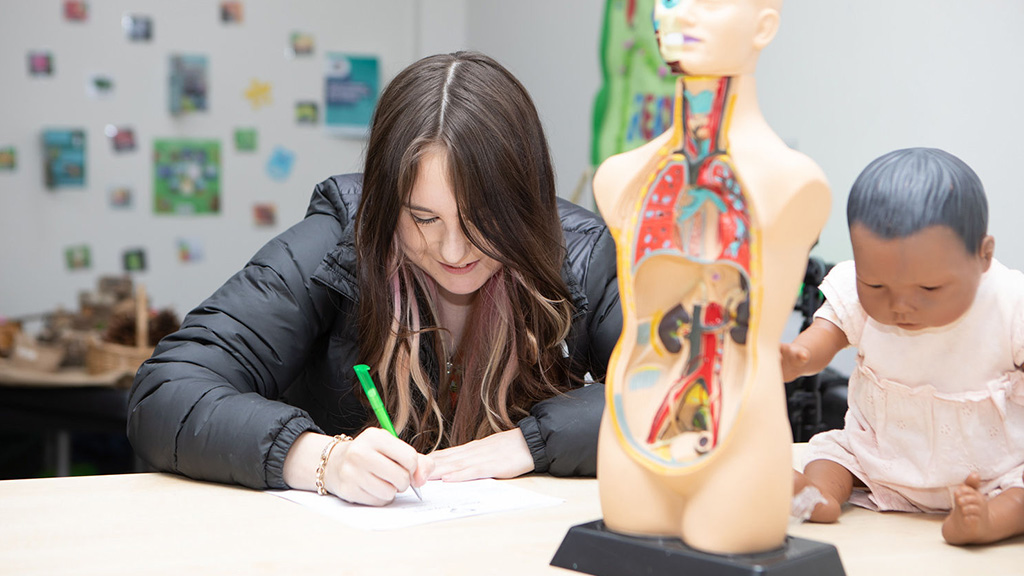Course Overview
This programme is intended for students wishing to work professionally with children aged 0-8 years, or for those already working with children in this age group who are seeking a higher level qualification. It equips you with the concepts, knowledge and skills required for a professional role in the Early Years sector.
You will develop an understanding of the subject and field which will enable you to participate in planning, evaluating and implementing the education and care of young children aged 0-8 years. You will be able to use this knowledge and understanding to support your practical work with children in the workplace. It is fundamental to the approach of the course that theory and practical work are inter-related.
The course explores the needs and experiences of children and investigates how education shapes their development. It aims to develop professional and practical skills such as planning, assessment and teamwork, enhancing your employability and building a solid foundation for further study. There is clear evidence that a graduate qualification in this sector is helping to professionalise and raise the standards of childcare and education, as well as strengthen opportunities for individual promotion.
What You Will Study
Students complete the Certificate Stage in Year 1 and the Diploma Stage in Year 2.
Certificate stage modules currently (subject to change) include:
- Study and Research Skills
- Human Growth and Development
- Personal and Practice Development (1)
- Promoting Child Health and Wellbeing
- Early Years Observation and Assessment
- Early Years Learning Approaches and Play
Diploma Stage modules currently (subject to change) include:
- Research in the Early Years Sector
- Reflective Practitioner
- Partnerships with Parents and Families
- Personal and Practice Development (2)
- Safeguarding Babies and Young Children in the Early Years
- Leadership and Empowerment
Assessments for the course may take a variety of forms, from practical tasks, group work and presentations to formal, written assignments and reports.
To ensure your learning is current and valid we have mapped the Early Childhood Studies Degree Network (ECSDN) Graduate Practitioner Competencies to each module. ECSDN Booklet - Front Cover July 2020.
- Entry Requirements
48 UCAS Tariff points from either:
- BTEC Level 3 National Diploma (QCF) in Children's Play, Learning and Development
- BTEC Level 3 Extended Diploma (QCF) in a relevant subject (e.g. Childcare, Health and Social Care)
- A Levels
You must be over 18 years of age and should be employed within the sector, either paid or unpaid, for a minimum of 240 hours over the three year period.
The following are also required:
- An Enhanced Disclosure and Barring Service check
- Two satisfactory references
- A work-based mentor (You will also receive workplace visits from your tutors)
- Grade C/4 or above in GCSE English
- Grade C/4 and above in GCSE Maths and Science (desirable)
Applications from mature students with relevant professional/life experience are welcome. You might be required to provide further evidence to decide on your suitability for the course and an admissions test may be used in certain circumstances.
- Fee Information
Full time: £7,400 Part time: £4933 per year
- Further Study
After successful completion of the Foundation Degree in Early Childhood Studies, you may progress, subject to a selection process, to the final stage of the degree in Education at the University of Hull:
- BA (Hons) Early Childhood Education and Care
- BA (Hons) Learning and Teaching – Primary Education with QTS (for applicants with substantial primary school (5-11) experience)
- BA (Hons) Education and Learning
A range of job roles are possible after successful completion of the Foundation Degree/Top Up Degree including:
- Nursery Manager or Supervisor
- Early Years Teacher
- Learning Mentor
- Primary School Teacher
- Teaching Assistant
- Nanny
- Childminder
- Youth Worker
- Social Worker
With further specialist study, other job opportunities may include:
- Community Development Worker
- Counsellor
- Educational Psychologist
- Paediatric Nurse
- Speech and Language Therapist
Past learners have progressed on to the following careers:
- Management positions in Early Years nurseries/settings
- Higher Level Teaching assistant roles
- Primary School Teachers
- Early Years Practitioners in nursery settings
- Social Work
- Running their own businesses in the Early Years sector




